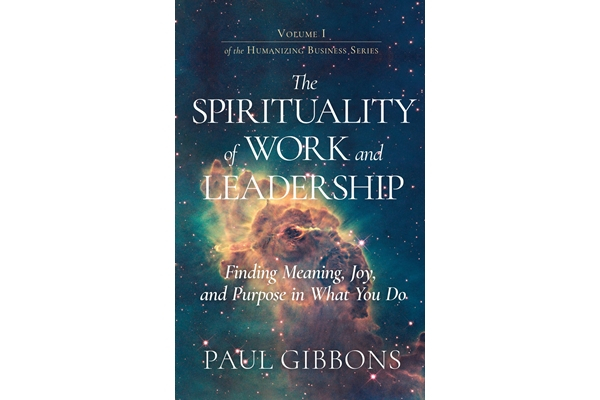At the dawn of the third decade of this millennium, we have new workplace mantras: Find meaning. Love your work. Lead with purpose. Make a difference.
Before the COVID-19 pandemic, there was another business crisis—one of meaning. A Gallup poll found that only 13% of workers were fully engaged at work, and 24% were actively disengaged. The problem is, you cannot cut a check to buy your workers meaning. You need to provide work that has intrinsic value—a purpose, not just a paycheck.
Moreover, our business world is continually punctuated by ethical scandals: Enron, Wells Fargo, Pharma Bro, BP, Weinstein, Kingfisher Airlines, Purdue Pharma, Theranos, Facebook, WeWork, Uber, and Boeing’s 737 Max.
Can these dual crises be solved by the same kind of thinking that created them? Perhaps not. According to Forbes Magazine, workplace spirituality may be the hottest workplace trend for 2021. The Spirituality of Work and Leadership aims to be the most comprehensive treatment of workplace spirituality to date and asks whether spirituality helps with meaning-making, workaholism, vocation and purpose, happiness, mindfulness, altruism, motivation, engagement, and leadership.
Three spiritual stories
The oldest story—what I call the greatest story ever told—is about how spirituality helped humans rise from the savannah and proceed from being frail, hairless bipeds to sending spaceships outside our solar system and to other planets. Spirituality, in our hunter-gatherer past, helped us come together, bond, form communities, and develop shared moral codes.
However, if you look around today, spirituality, particularly of the religious variety, seems to divide us. While it provides comfort and meaning to individuals, it has not (yet) helped us come together in business, let alone help us in coming together as a world to solve big problems.
The second story is of the relationship between spirituality and working—one that is newer, but still thousands of years long. Accounts of work in religious texts are mostly harsh. In Christianity, work was penance for the Fall of Man. In medieval European times, religion was used to justify class difference and oppression—non-European economies also had “caste systems,” and religious “wisdom” was often provided as justification for exploitation.
Finally, there is the story of my research while trying to batter down the doors of the corporate establishment, starting with founding a spiritual consulting firm in 2000 and putting spiritual principles to work in organisations such as Shell, Unilever, KPMG, and HSBC.
The spiritual CEO?
“An incredible dive into the intersection of spirituality and business. Gibbons wrote the book that needed to be written for our world—showing us how our spirituality is the key to our humanity in business.”— Marshall Goldsmith
Meaning and purpose have a spiritual component, but businesses aren’t temples, and their leaders aren’t spiritual teachers. Further, businesses, if they take this to heart, must navigate a diverse world of spirituality, full of mystics, yogis, the traditionally religious, the New Agers, and humanists—the book offers guidance on how to do that.
I aim to explore these topics not, as some writers do, through feel-good platitudes that create a “sugar high,” but in a scholarly fashion. This book relies on the work of Nietzsche on meaning, Harvard’s Steven Pinker and Michael Sandel on altruism, Yuval Harari on evolutionary biology, neuroscientist Richard Davidson on mindfulness, Aristotle on happiness, and theologians from the Abrahamic and Eastern religions. Rather than just a book with philosophical ideas, the book has tools based on science and philosophy, which leaders can use inside their businesses.
When I founded my consulting firm, my message was “better leaders for better businesses for a better world.” The Spirituality of Work and Leadership is a step in that direction.
To know more about Paul, visit paulgibbons.net. His book is now available on Amazon here.
Follow us on LinkedIn, Facebook, Instagram, Twitter for latest HR news and insights.

Has COVID-19 forever changed the way we live and work?
Trending
-
SBI General Insurance Launches Digital Health Campaign
-
CredR Rolls Out 'Life Happens' Leave For Its Employees
-
Meesho Announces 30-Week Gender-Neutral Parental Leave Policy
-
Microsoft Unveils Tech Resilience Curriculum To Foster An Inclusive Future
-
60% Indian Professionals Looking For Job Change Due To COVID: Survey
-
SpringPeople And Siemens Collaborate For Digital Transformation Push
-
86% Professionals Believe Hybrid Work Is Essential For Work Life Balance: Report
-
Almost 1 In Every 3 People's Personal Life Affected Due To Work Stress
-
Meesho Rolls Out Reset And Recharge Policy For Employees
-
80% Of Talent Leaders & Academics Say Pandemic Changed Skill Needs For Youth: Report
-
Hero Electric Rolls Out 'Hero Care' Program For Employees
-
Human Capital In Collaboration With ASSOCHAM Hosts Virtual Conference
-
IKEA India, Tata STRIVE Collaborate To Create Employability And Entrepreneurship Opportunities
-
SAP India, Microsoft Launch Tech Skilling Program for Young Women
-
DXC Technology, NASSCOM Collaborate For Employability Skills Program
-
Lenskart To Hire Over 2000 Employees Across India By 2022
-
Mindtree Launches Learn-and-Earn Program
-
Tata AIA Extends 'Raksha Ka Teeka' To Its Employees
-
Swadesh Behera Is The New CPO Of Titan
-
NetConnect Global Plans To Recruit 5000 Tech Professionals In India
-
Hubhopper Plans To Hire 60% Of Indian Podcasters By 2022
-
Corporate India Needs More Women In Leadership Roles: Report
-
Aon to Invest $30 Million and Create 10,000 Apprenticeships by 2030
-
Tech Mahindra Launches ‘Gift a Career’ Initiative for Upskilling of Youth
-
40% Women Prefer Flexible Working Options in Post-COVID World: Survey
-
3 out of 4 companies believe they can effectively hire employees virtually: Report
-
Vodafone , CGI and NASSCOM Foundation launch digital skills platform
-
Odisha: Bank, postal employees to deliver cash for elderly, differently-abled persons
-
Skill India launches AI-based digital platform for "Skilled Workforce"
-
Hiring activity declines 6.73% in first quarter: Survey
-
70% startups impacted by COVID-19 pandemic
-
Bajaj Allianz Life ropes in Santanu Banerjee as CHRO
-
Over 70 Percent MSMEs look at cutting jobs to sustain businesses
-
93 Per Cent employees stressed about returning to office post-lockdown
-
Johnson & Johnson India announces family benefits for same gender partners
-
Indian firms turning friendly towards working mothers
-
Welspun India names Rajendra Mehta as new CHRO
-
Wipro partners with NASSCOM to launch Future Skills platform



Human Capital is niche media organisation for HR and Corporate. Our aim is to create an outstanding user experience for all our clients, readers, employers and employees through inspiring, industry-leading content pieces in the form of case studies, analysis, expert reports, authored articles and blogs. We cover topics such as talent acquisition, learning and development, diversity and inclusion, leadership, compensation, recruitment and many more.
Subscribe Now












































Comment